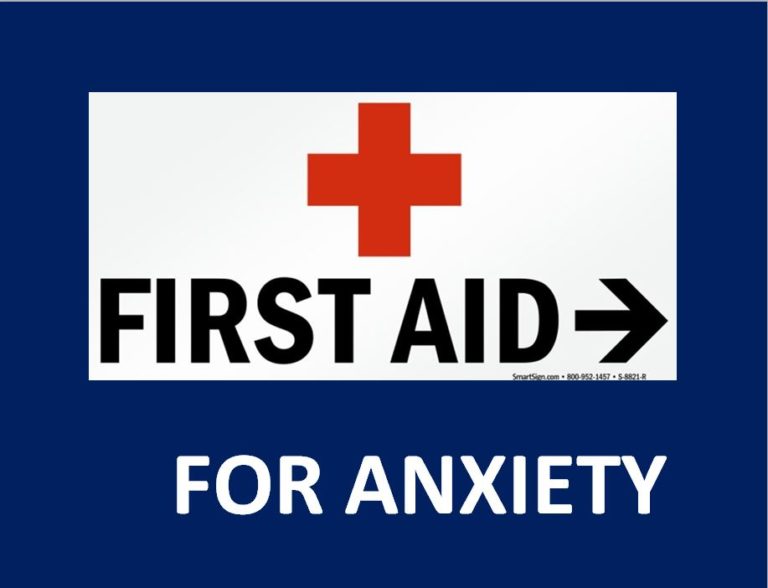
Given the recent election results, I have received many panicked phone calls from folks terrified about what will happen to our country. While I do not wish to get into political discussions, I do wish to respond to those feeling anxious and provide concrete steps to take to reduce their discomfort.
Anxiety is a serious and complex problem for many people. In some cases, successful treatment requires a combination of psychotherapy and medication. For many, however, employing some basic first-aid can render significant and immediate relief. Here are four steps which, if followed, can quickly and dramatically reduce the crippling effects of panic and anxiety attacks.
1) Recognize and Identify Anxiety.
Anxiety is not all the same and it appears on a spectrum ranging from simple uneasiness or worry to crippling panic and terror.
The first step to coping with anxiety is to recognize it as soon as possible. The closer one gets to panic, the more difficult it is to recover. Fortunately, your body alerts you when anxiety is present. Anxiety often first appears as a muscular tension somewhere in your body.
Some experience anxiety as a tightness in their jaw, throat, back, chest or stomach, etc. When you feel this tension, you can, with practice, learn to recognize the tightness as an anxiety alarm and respond with calming techniques. Learning where your area of distress is can help you short-circuit your anxiety response before it becomes full-blown.
2) Identify and Withdraw from Toxic Stimulus.
Once you become aware that you are in distress, you need to recognize the source and remove yourself from exposure to it. For example, if you are talking either on the phone or in person and distress arises, end the conversation. If you become distressed while watching something on TV, phone, or computer, change channels or turn it off.
If you are disturbed by the recent political elections, don’t watch news programs that dissect the results or make predictions of what will happen. Likewise, limit the time you spend on social media.
3) Basic Anxiety-Reducing Techniques
There are some simple and effective techniques to reduce the symptoms of anxiety. First-Aid for Anxiety | Pastoral Counseling Syracuse NY
— Change your breathing. Anxious breathing is rapid shallow and not fully exhaled. Slowing down the pace, deepening each breath and fully exhaling sends a message to your brain to turn off the release of stress hormones, cortisol and adrenaline. Usually, within 10-15 minutes, your body will be calmer, and you will feel more relaxed. https://www.verywellmind.com/abdominal-breathing-2584115 Breathwork: A Beginner’s Guide. Breath Meditation for Stress Relief: How It Can Boost Your Resilience
— Release some endorphins. Doing some exercise or taking a brisk walk for 20 minutes will release endorphins, which help wash stress hormones out of your system and help you feel good again. When exercise is combined with energizing music, the effect is increased.
— Meditate, do some yoga, listen to music/ dance; Anxiety is related to worrying about the past or fearing the future. Focusing on the immediate present is a powerful way to switch off the anxiety channel. Meditation and yoga are ways to help you stop thinking and focus your conscious attention on physical sensations. Likewise, music and dance help you get into the moment and experience joy.
4) Put things into Perspective by Journaling: .
When you are in a calmer place, primary-process journaling can help you gain perspective on your anxiety. It is a safe place to reflect upon and reality test some of the fears at the base of your worry and anxiety.
As one feels better and the anxiety level falls, neuro-pathways to the cortex, which were broken during the emotional upset, are re-established. The person can regain the ability to think and put the recent disturbing incident into a rational context. The stimulus that generated the anxiety can be identified and reality-tested in terms of its severity and imminent threat level. As a result, the person can realize that their initial reaction was most likely distorted and exaggerated and reasonable demeanor can be resumed.
In some cases, the danger is genuine and not exaggerated. Even so, gaining control of your emotions is crucial to dealing with difficult times. In these circumstances, stress management can help you to cope more effectively even while the danger persists.
With a little practice, a person can become confident that they know how to quickly and effectively handle emotional troubles when they arise before they interfere with their life. If anxiety is persistent, however, and is not helped by these techniques, talking to a therapist and or a doctor is advised.
Rev. Michael Heath, LMHC Fellow AAPC Novermber 6 , 2024
* It should be noted that in some instances, the physical symptoms of an intense panic attack are indistinguishable from those of a heart attack, and thus, immediate medical evaluation should be obtained.
Image attribution and acknowledgment: smart Signs.com



